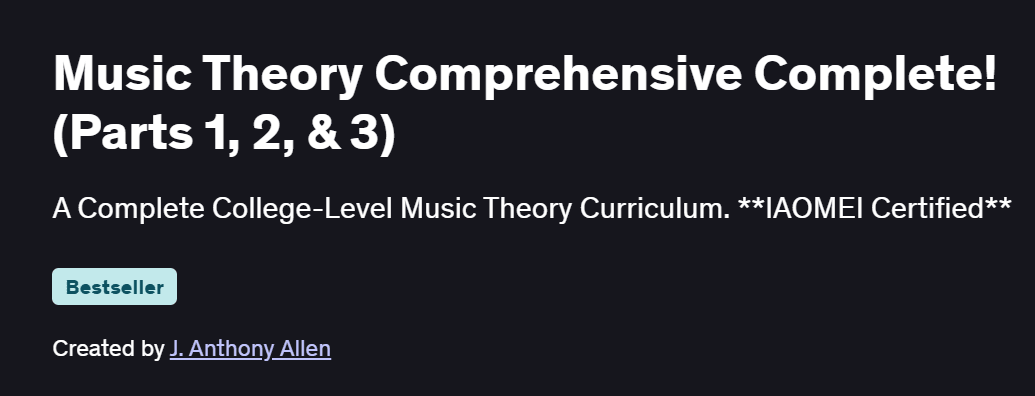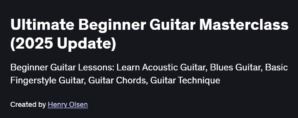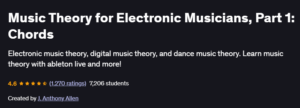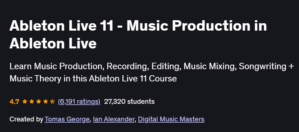What will you in Music Theory Comprehensive Complete! (Parts 1, 2, & 3) Course
- Read and write standard musical notation with confidence
- Understand scales, modes, intervals, and key signatures
- Analyze chord construction, progressions (diatonic and secondary), and harmonic function
- Master rhythm, meter, and advanced concepts like syncopation and polyrhythms
- Apply music theory to composition, arrangement, and improvisation
Program Overview
Part 1: Notation & Pitch Fundamentals
⏳ 45 minutes
The staff, clefs, note values, and naming pitches
Ledger lines, accidentals, and octave transpositions
Part 2: Scales, Keys & Modes
⏳ 1 hour
Major and natural/minor scales, relative and parallel minors
Church modes (Ionian through Locrian) and modal characteristics
Part 3: Intervals & Ear Training
⏳ 45 minutes
Interval identification, quality (major, minor, perfect, augmented, diminished)
Practical ear-training exercises for melodic and harmonic intervals
Part 4: Rhythm, Meter & Subdivision
⏳ 1 hour
Simple, compound, and mixed meters
Syncopation, ties, dotted rhythms, and tuplets
Part 5: Chord Construction & Harmony
⏳ 1 hour
Triads, seventh chords, extended tertian harmony (9ths, 11ths, 13ths)
Voice leading rules and four-part chorale style
Part 6: Chord Progressions & Functional Harmony
⏳ 1 hour
Diatonic progressions (I–IV–V, ii–V–I) and secondary dominants
Modulation techniques and pivot-chord transitions
Part 7: Advanced Topics & Application
⏳ 1 hour
Modal interchange, borrowed chords, and chromatic harmony
Applying theory to songwriting, arrangement, and improvisation frameworks
Get certificate
Job Outlook
- A solid grounding in music theory is essential for composers, arrangers, and session musicians
- Highly valued in roles like Music Educator, Arranger, and Producer across genres (classical, jazz, pop)
- Enables confident chart reading, transcription, and collaboration in professional studios
- Provides a foundation for advanced studies in composition, orchestration, and audio production
Specification: Music Theory Comprehensive Complete! (Parts 1, 2, & 3)
|
FAQs
- No prior musical experience required.
- Covers notation, clefs, note values, and pitch fundamentals.
- Introduces scales, modes, and intervals progressively.
- Suitable for musicians, songwriters, and hobbyists.
- Provides a foundation for advanced study in composition and arranging.
- Covers triads, seventh, and extended chords (9ths, 11ths, 13ths).
- Teaches voice leading and four-part chorale style.
- Explains diatonic progressions and secondary dominants.
- Introduces modulation and pivot-chord techniques.
- Applies theory directly to composition and arrangement exercises.
- Explains note durations, rests, and time signatures.
- Covers syncopation, ties, dotted rhythms, and tuplets.
- Teaches simple, compound, and mixed meters.
- Includes exercises for sight-reading and rhythmic accuracy.
- Applies rhythm concepts to both classical and modern music contexts.
- Provides practical ear-training exercises for melodic and harmonic intervals.
- Teaches major, minor, perfect, augmented, and diminished interval recognition.
- Strengthens sight-singing and transcription skills.
- Enhances improvisation and composition abilities.
- Encourages confident listening and musical analysis.
- Builds comprehensive music theory knowledge for professional applications.
- Prepares learners for studio, performance, and teaching roles.
- Enhances composition, arrangement, and improvisation skills.
- Lays the groundwork for advanced studies in orchestration and audio production.





